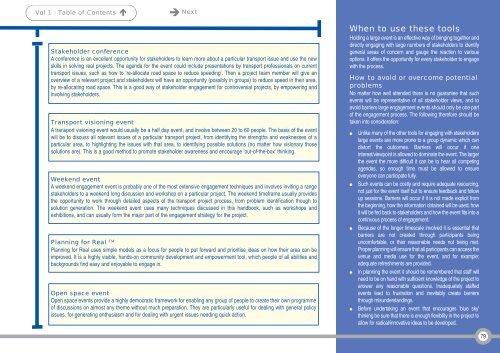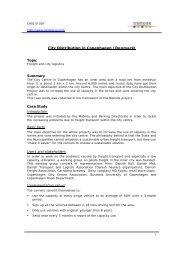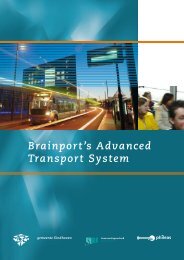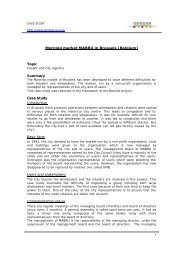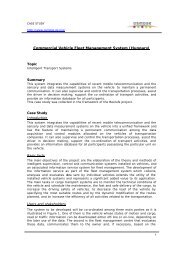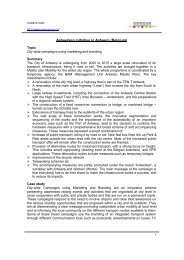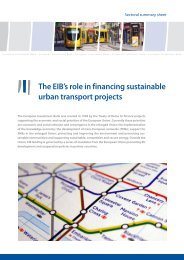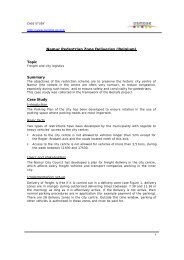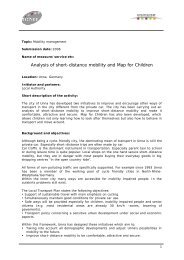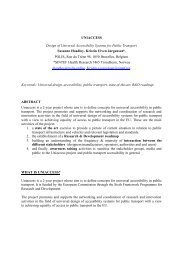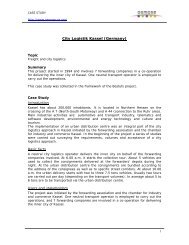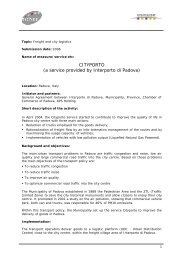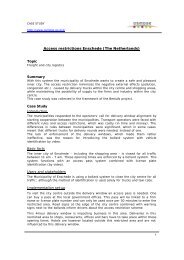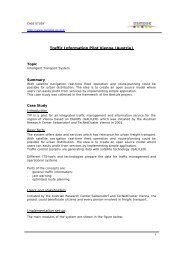Successful transport decision-making - Osmose
Successful transport decision-making - Osmose
Successful transport decision-making - Osmose
Create successful ePaper yourself
Turn your PDF publications into a flip-book with our unique Google optimized e-Paper software.
Vol 1 - Table of Contents <br />
Next<br />
Stakeholder conference<br />
A conference is an excellent opportunity for stakeholders to learn more about a particular <strong>transport</strong> issue and use the new<br />
skills in solving real projects. The agenda for the event could include presentations by <strong>transport</strong> professionals on current<br />
<strong>transport</strong> issues, such as how to 're-allocate road space to reduce speeding'. Then a project team member will give an<br />
overview of a relevant project and stakeholders will have an opportunity (possibly in groups) to reduce speed in their area,<br />
by re-allocating road space. This is a good way of stakeholder engagement for controversial projects, by empowering and<br />
involving stakeholders.<br />
Transport visioning event<br />
A <strong>transport</strong> visioning event would usually be a half day event, and involve between 20 to 60 people. The basis of the event<br />
will be to discuss all relevant issues of a particular <strong>transport</strong> project, from identifying the strengths and weaknesses of a<br />
particular area, to highlighting the issues with that area, to identifying possible solutions (no matter how visionary those<br />
solutions are). This is a good method to promote stakeholder awareness and encourage 'out-of-the-box' thinking.<br />
Weekend event<br />
A weekend engagement event is probably one of the most extensive engagement techniques and involves inviting a range<br />
stakeholders to a weekend long discussion and workshop on a particular project. The weekend timeframe usually provides<br />
the opportunity to work through detailed aspects of the <strong>transport</strong> project process, from problem identification though to<br />
solution generation. The weekend event uses many techniques discussed in this handbook, such as workshops and<br />
exhibitions, and can usually form the major part of the engagement strategy for the project.<br />
Planning for Real <br />
Planning for Real uses simple models as a focus for people to put forward and prioritise ideas on how their area can be<br />
improved. It is a highly visible, hands-on community development and empowerment tool, which people of all abilities and<br />
backgrounds find easy and enjoyable to engage in.<br />
Open space event<br />
Open space events provide a highly democratic framework for enabling any group of people to create their own programme<br />
of discussions on almost any theme without much preparation. They are particularly useful for dealing with general policy<br />
issues, for generating enthusiasm and for dealing with urgent issues needing quick action.<br />
When to use these tools<br />
Holding a large event is an effective way of bringing together and<br />
directly engaging with large numbers of stakeholders to identify<br />
general areas of concern and gauge the reaction to various<br />
options. It offers the opportunity for every stakeholder to engage<br />
with the process.<br />
How to avoid or overcome potential<br />
problems<br />
No matter how well attended there is no guarantee that such<br />
events will be representative of all stakeholder views, and to<br />
avoid barriers large engagement events should only be one part<br />
of the engagement process. The following therefore should be<br />
taken into consideration:<br />
<br />
<br />
<br />
<br />
<br />
Unlike many of the other tools for engaging with stakeholders<br />
large events are more prone to a group dynamic which can<br />
distort the outcomes. Barriers will occur if one<br />
interest/viewpoint is allowed to dominate the event. The larger<br />
the event the more difficult it can be to hear all competing<br />
agendas, so enough time must be allowed to ensure<br />
everyone can participate fully.<br />
Such events can be costly and require adequate resourcing,<br />
not just for the event itself but to ensure feedback and follow<br />
up sessions. Barriers will occur if it is not made explicit from<br />
the beginning, how the information obtained will be used, how<br />
it will be fed back to stakeholders and how the event fits into a<br />
continuous process of engagement.<br />
Because of the longer timescale involved it is essential that<br />
barriers are not created through participants being<br />
uncomfortable, or their reasonable needs not being met.<br />
Proper planning will ensure that all participants can access the<br />
venue and media use for the event, and for example;<br />
adequate refreshments are provided.<br />
In planning the event it should be remembered that staff will<br />
need to be on hand with sufficient knowledge of the project to<br />
answer any reasonable questions. Inadequately staffed<br />
events lead to frustration and inevitably create barriers<br />
through misunderstandings.<br />
Before undertaking an event that encourages 'blue sky'<br />
thinking be sure that there is enough flexibility in the project to<br />
allow for radical/innovative ideas to be developed.<br />
79


